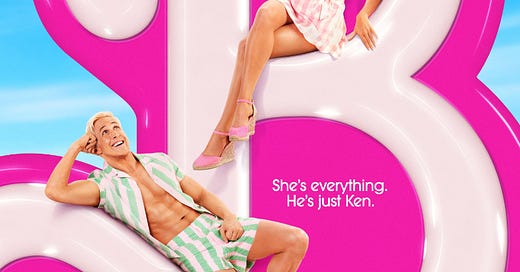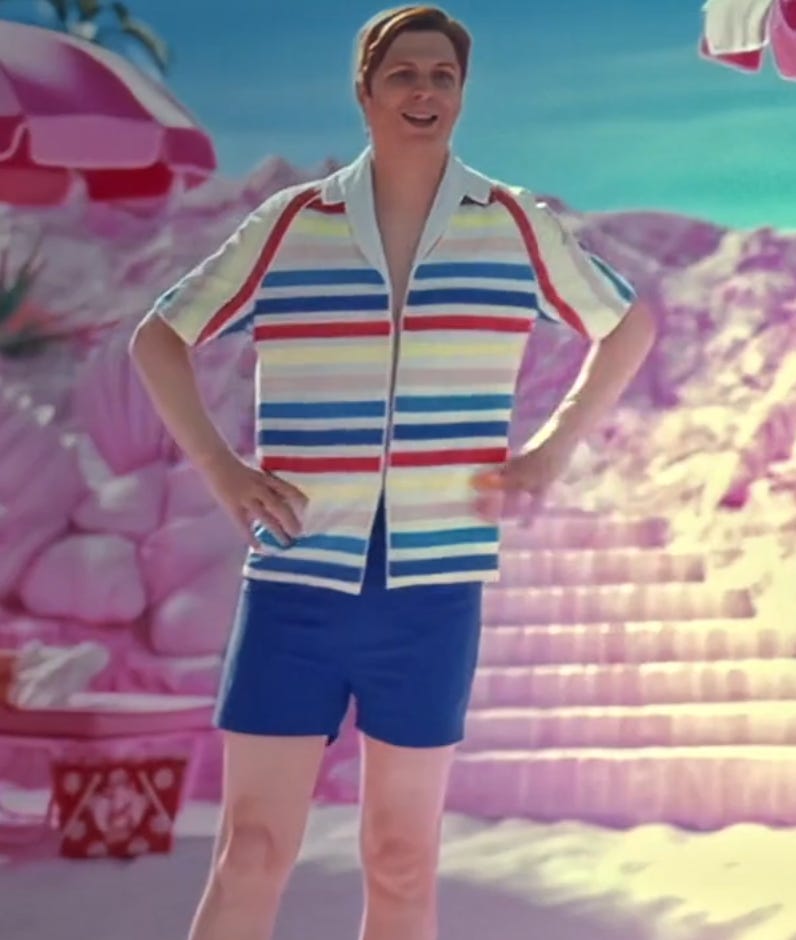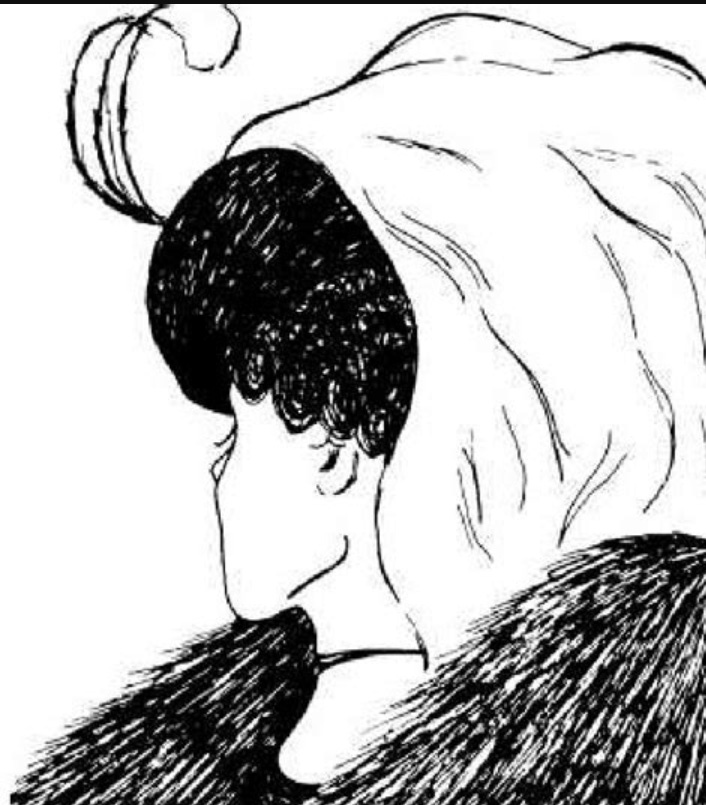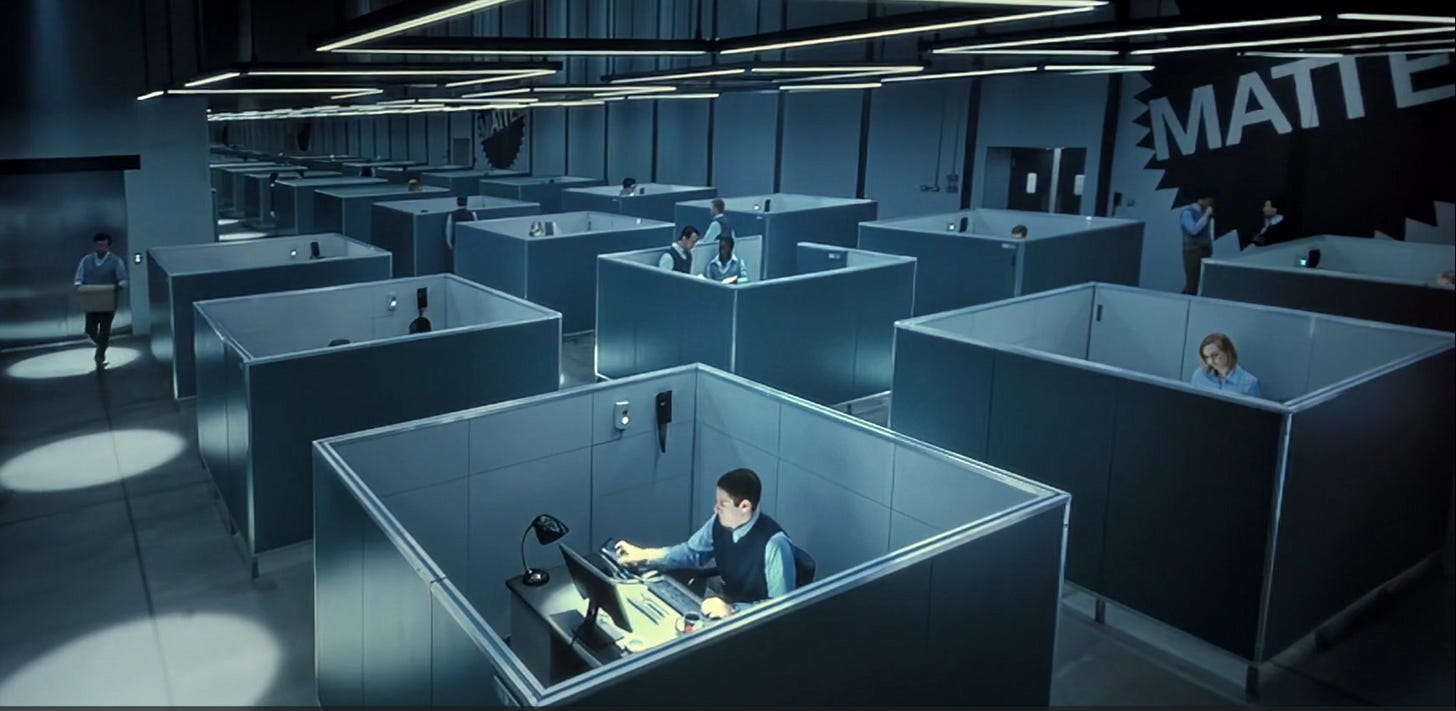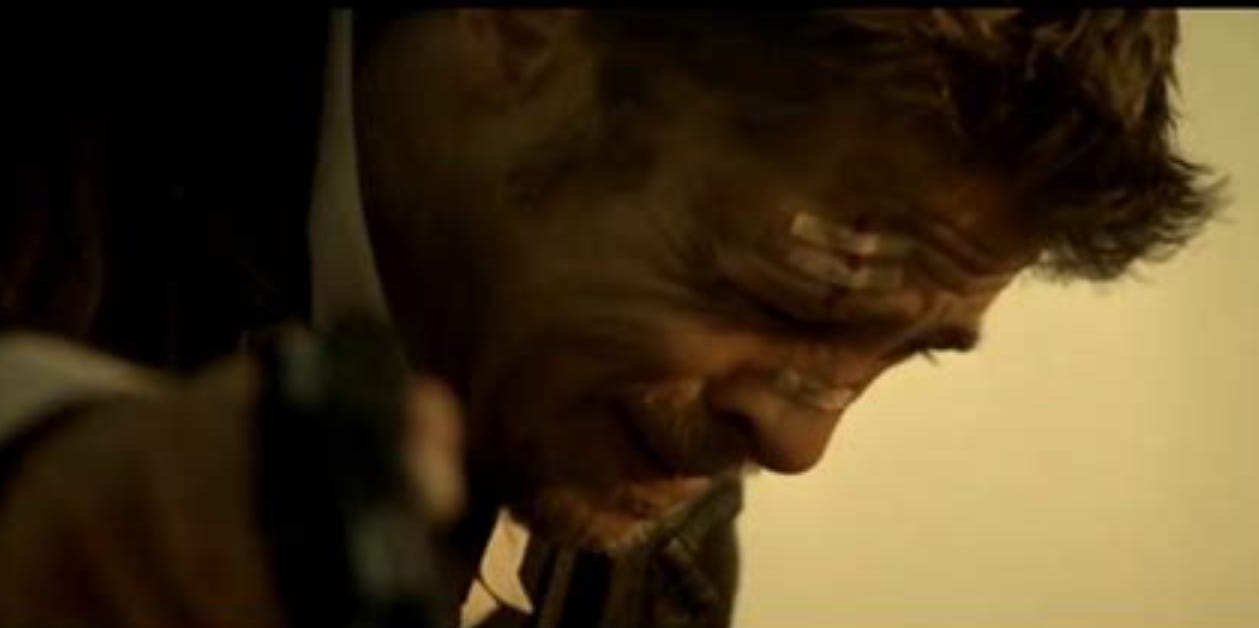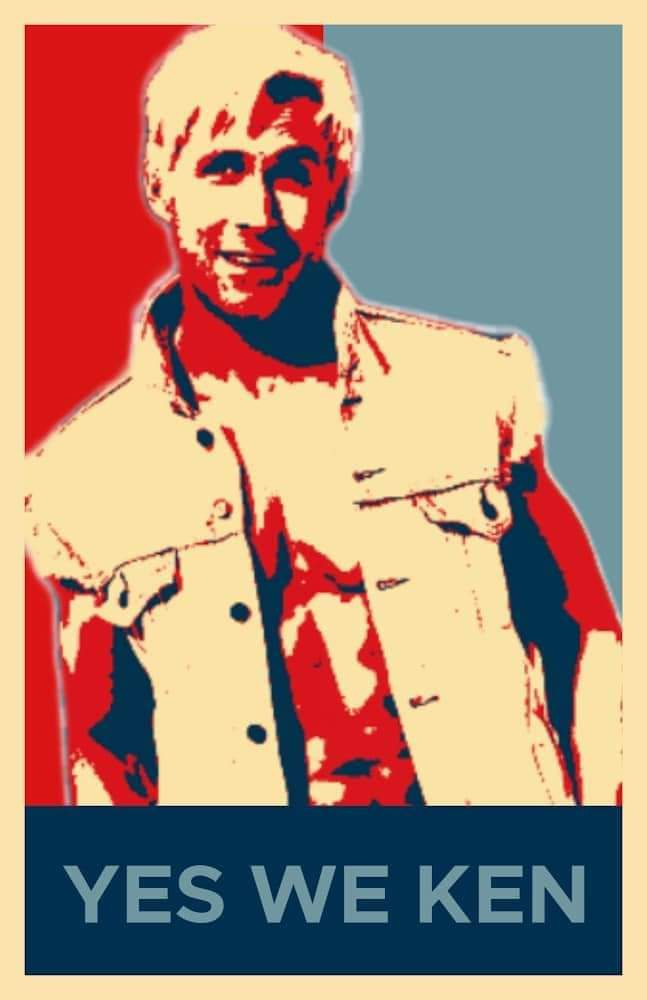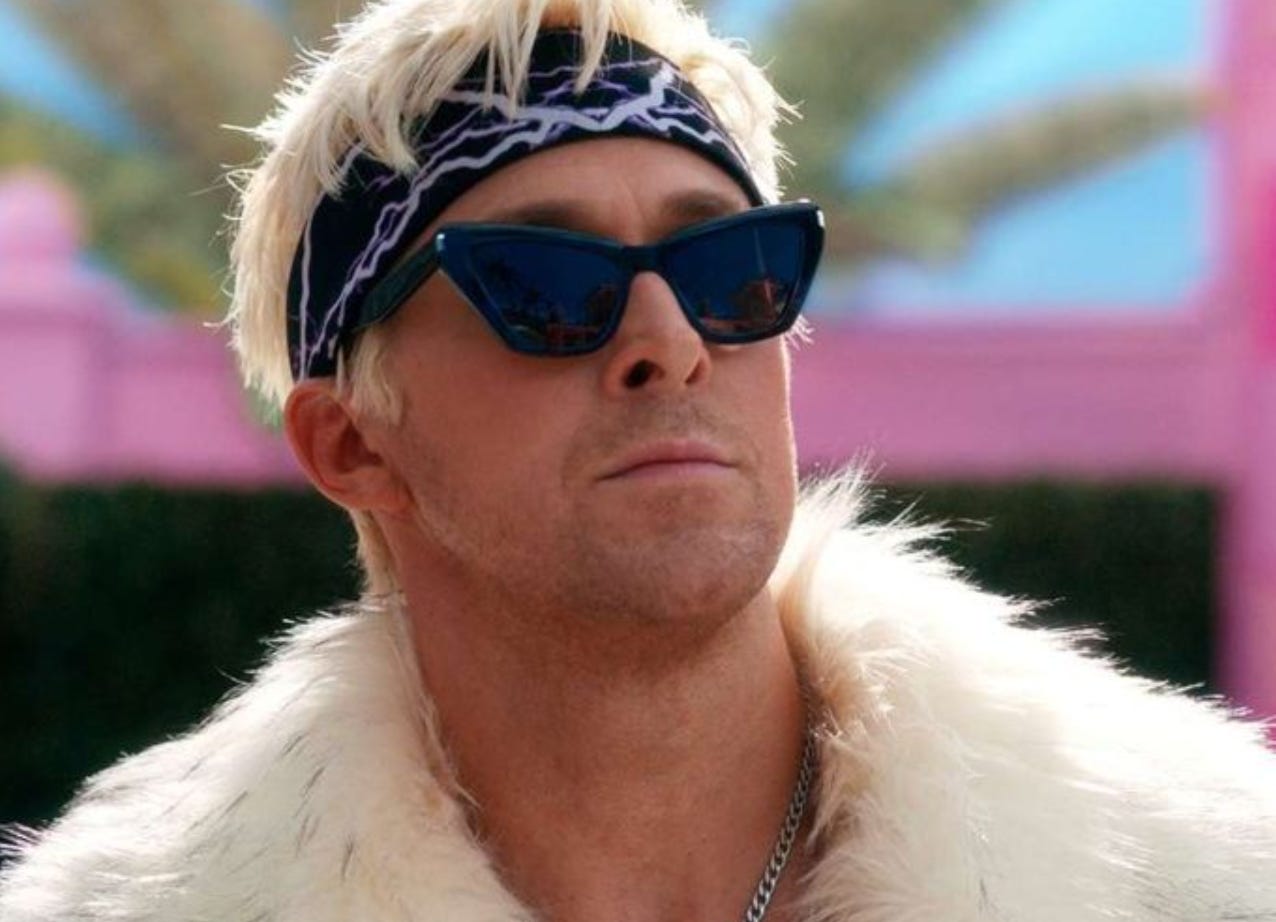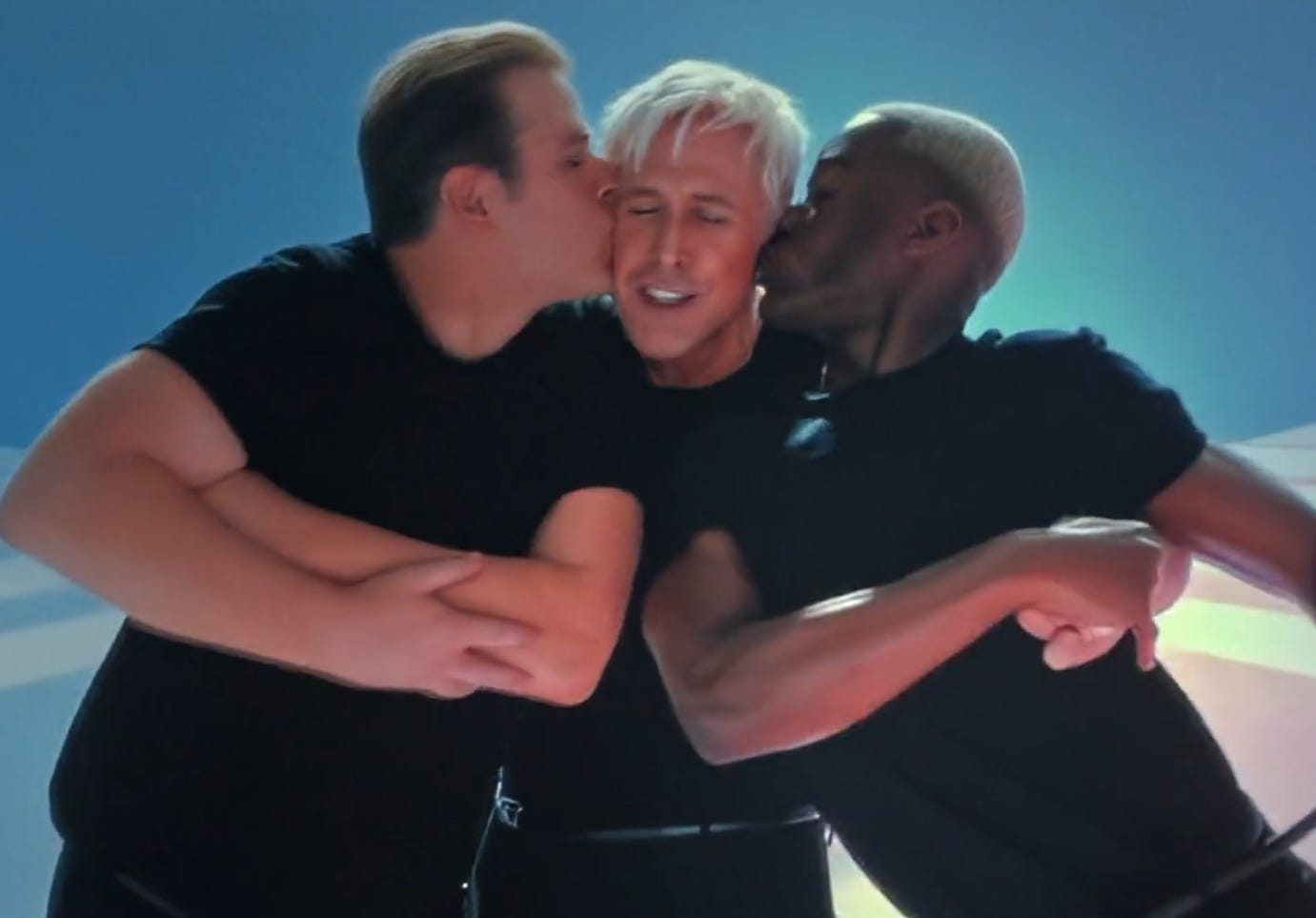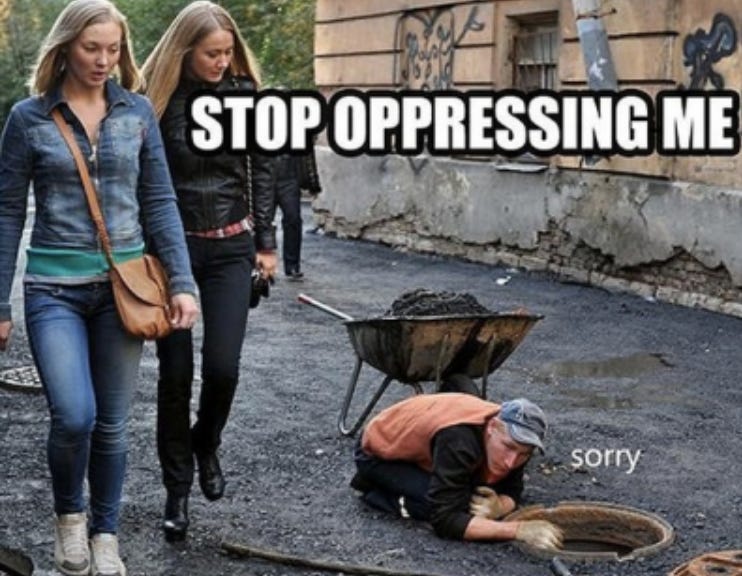Hey all, Jack here.
When The Barbie Movie hit theaters on July 21st, the internet was immediately awash in conflicting reviews, and not even along the ideological lines that one might expect. For every Critical Drinker decrying it as insidiously misandrous, there was a Shoe on Head praising it as actually being anti-Woke, even if by accident.
I had no interest in the film. Honestly, I expected it to be candied trite at best or woke propaganda at worst, but I soon found myself inundated with requests to review it. Both friends and fans (all three of them) wanted my own unique perspective on whether or not this film was man-hating or maybe something special.
Given the conflicting opinions out there, well, I’d be lying to say I wasn’t intrigued.
I came into this movie with two questions in mind: First, is it woke? As a writer who covers wokism in depth, that’s what most were curious to hear from me. But this is still something of a movie review, so in the spirit of good faith, secondly, I asked, how does it serve as a film, regardless of messaging?
Now that the screen has dimmed, as the crowd shuffled stiffly from the aisles and the unforgiving sun stabbed my post-theater eyes, I’ve come away tossing these questions about my mind.
The answer to both may not be quite as simple as you’d expect.
(Oh, and because trigger warnings are a thing, there will be spoilers. Skip to the Conclusion for the tl;dr.)
In a Barbie World
This is the part where most writers give a breakdown of the subject matter to set the stage, but no one reading this needs any refresher on the Barbie franchise. If you don’t know what a Barbie doll is, chances are you’re probably Down Syndrome Barbie.
I should say upfront that, to Barbie’s credit, the premise of a movie based on a story-less series of dolls is no easy task. It’s damn near impossible to take brand power with no built-in canon and make something remotely cogent. To this end, the Barbie movie was, by my estimation, a resounding success.
But was it actually good?
And more importantly, was it woke?
Well, let’s find out.
The film starts with a play on the opening of Stanley Kubrick’s famous 2001: A Space Odyssey, where we’re soon treated to Kaiju Barbie, here to free children from the impending fate of motherhood.
Japan is well prepared for this.
This scene, depicting children playing with baby dolls, pretending to be mothers and housewives, is often criticized as being anti-natalist. It’s hard to deny the sentiment as the kids violently thrash against the dolls and their tea-party toys after the narrator sardonically quips about how playing mom can be fun…until it isn’t.
“Ask your mother,” she says, her tone curiously dark.
The narrator brightens as she goes on to describe the wonderful impact that Barbie had, inspiring young girls to grow into self-actualized women, capable of achieving anything they “set their minds to.”
I found this somewhat refreshing, to be honest, as they didn’t say “anything a man can do.”
The hint of snark as she continues, describing how disconnected from the real world the Barbies are, forebodes the coming cultural dichotomy — the classic fish-out-of-water trope that will play a big role in the plot.
The perfection of Barbie Land can’t be overstated, but that doesn’t stop them from trying. The first ten minutes is a series of tautologies on the wonders of the mystical, ideal world, where the women hold all positions of power, and every day is wonderful…except for Ken.
See, Ken is only happy when Barbie validates him.
To be fair, she doesn’t seem to overtly treat him poorly, if anything she’s simply clueless of his presence. And the movie does address this, but I’m getting ahead of myself.
They show some of the other Barbies during the credit scroll, including Midge, a pregnant doll that was discontinued because that would be too weird.
Interestingly, she’s referenced again later as a jump scare for Will Ferrell. It would be easy to read into this as further anti-marriage or anti-natalism, but I’m not entirely convinced that this is the goal.
Now, to be clear, having a black, female actor as president isn’t woke, but when you show her being praised while Lizzo giddily repeats in the background, “Black Barbie President…Black Barbie President…” it’s so on the nose, it’s in your skull.
“I could be Kamala hahaha—just kidding. Unless Joe dies—hahahaha—what?”
Woman Who Doesn’t Look Like a Barbie Barbie then sermonizes on how “money is not speech, and corporations don’t have free speech rights to begin with.”
As the Barbies stand in glowing ovation, she adds that corporate claims of free speech turns democracy into a plutocracy, and that makes her emotional, but she’s expressing it logically. You see, not only can she have both emotions and logic at the same time, this totally empowers her.
Soon, we’re treated to a painfully long scene of random people saying “hi Barbie, hi Ken!”
It’s at this point that I began to wonder if I shouldn’t have eaten that moldy bread…
C-c-c-c-combo breaker!
And that’s our introduction to this fantastical place of female empowerment.
I’ll admit, the first twenty minutes really weren’t that bad. I guess by saying that, I’m giving away the fact that I do have contentions with the film, but it certainly doesn’t come off as too preachy or in any way mean spirited. Political, sure, but we all knew that would be the case going in.
Well…at least not in contrast with the rest of the movie.
As Barbie suffers her existential crisis and is guided on a journey of self discovery, aside from the points mentioned so far, much of what I was seeing was, well, just harmless girly stuff. The music was indeed candied and the colors pink enough to contribute to a global shortage, but about the time they arrive in the real world, a strange thought struck me…
Was the beginning intentional milquetoast to drop people’s guards?
Would the filmmakers be that…Machiavellian?
Was I overthinking it?
There was only one way to find out.
And yet, ironically, it was that very moment that I started struggling with the film.
The Mundo Real
Hearing all the disparate reviews of Barbie, I couldn’t help but wonder if the film was operating as a kind of Rorschach Test: as if your own state of mind or politics would shape what you were actually seeing. I would later hear others sharing this idea as well, so I figured I was onto something.
Now having watched it, I’m fairly certain that’s actually true, though I’d more liken it to an optical illusion, like the famous woman or crone image (seen below), or the duck or bunny shit that supposedly broke the internet.
The film seemed almost like two vague images overlapping, and with just the right shift of view, or a trick of the light, it’d become something largely different.
“Help! there’s an old lady in my neck!”
I think a contributing factor to this is their world’s own inconsistent logic. For example, the film tries to contrast Barbie World with “the real world,” but then depicts the real world just as cartoonish and painfully unrealistic as the former. It tries to establish a metaphor about female empowerment vis-à-vis a real male dominated power dynamic, but it doesn’t use a real example, just a ludicrously exaggerated fantasy of female victimhood.
Many took this as a satire of the excesses of feminism, but the story certainly doesn’t treat it that way. In fact, it’s the very foundation of what would later empower the Barbies.
In the filmmaker’s real world, everyone is overtly sexist — not only random guys on the street, but construction workers and even the police. And it’s not like any of these groups couldn’t be sexist, the problem is that they’re all sexist.
Literally, every last one.
Like most of this film, it’s the antithesis of subtle.
Curiously, Barbie says to Ken, “You’d think a construction site at lunch time would be the perfect place for a little woman power, but this one was so…male.”
That’s right ladies, defeat the patriarchy and this too can be your future.
Wait, is this film lowkey suggesting women should go into construction as opposed to STEM for once?
Is…is this based?
Regardless, the only time we see anything resembling the actual real world is when Barbie has a moment, sitting on a bench and watching families visiting, kids playing, a couple fighting…
Barbie displays an uncharacteristic empathy for men in this sequence as she smiles along with two who are smiling at each other, and frowns when she sees another man sitting alone and sad. Then she turns to an elderly woman and, after a long pause, says, “You’re so beautiful.”
The woman replies, “I know it.”
It was actually a fantastic scene…and yet, I suddenly couldn’t shake the sense that this movie was written, and directed, by two very different people.
It was like hearing two different voices that only just barely harmonized…until they didn’t, and in the discord, I wasn’t sure which voice to follow.
While Barbie has her moment, Ken sees a world where men are respected and respect each other, and we get a masculine montage that most men would find quite positive. It’s just self care, sports, horses, golf, mini fridges and…Bill Clinton?
Then comes the ultimate self-cuck.
“Mattel…that family fun gray place where cubicles have no exit.”
Mattel made the strange choice to depict itself as cold, stupid, and soulless.
Their board of directors are all men, even though in real real life it’s 6 men and 5 women. This is proven even more bizarre when Will Ferrell later points out that the company had female CEOs, which is true, in an effort to paint the company as not being sexist, and is even more fucking bizarre when you realize this is the Executive Producer for their films department:
So it’s both aware of reality and clearly intentionally misrepresenting it.
Was this supposed to be funny or did they do it to double down on their bleak visage of the real world?
Upon discovering that a Barbie is loose in the world, the CEO says they need to put her back in the box. This is never quite explained, but the imagery of bondage and containment is fairly clear: I couldn’t shake the notion that this was a metaphor for putting women back in the kitchen, but that makes no sense in the context of the film. It’s hard to be certain, because the movie literally gives us nothing else to go on but conjecture.
Another example that is often raised to highlight how the movie is mocking extreme feminism, or woke feminism, is when Barbie meets a girl named Sasha. The kid is a bully — don’t take my word for it, another kid tries to warn Barbie, but she doesn’t listen.
“Which one are you? Cunt Barbie?" Kill yourself, fascist!”
This kid is the typical mouthpiece of Neo Progressive rhetoric, accusing Barbie of representing everything wrong with our culture. “Sexualized capitalism;” promoting unrealistic physical traits; and even destroying the planet with the “glorification of rampant consumerism;” this bitch sees Barbie not only as a crazy person, but an unloading dock for all that famous Californian school system trauma.
According to this “tween,” Barbie set Feminism back by 50 years.
Admittedly, this is a strange notion when we think about how old Barbie is and how different the world is between now and the 1970s, but okay, she’s an asshole kid, right? Because she’s the bully, that means her commentary isn’t true. Maybe she still has a lot to learn.
Yet, the film almost immediately redeems the character. With a quick car chase later on, she’s suddenly one of the girls…and she continues to spew the same rhetoric, all the way to end.
And let’s be clear, she’s never called out for it or demonstrated to be wrong. It’s just how she addresses the world. The implication therefore is she’s representing this new breed of “progressivism” that the kids are all being taught at such a young age.
Yet, even though the character is clearly Woke, that doesn’t necessarily mean the movie is. Up to this point, I wouldn’t call it woke…more like, well, sloppy. Which, granted, is bizarre when you consider the excellent acting, editing, framing and cinematography at play. The movie was absolutely made by professionals and it shows. Why, then, be so messy with the messaging?
Ken pursues his curiosity of a non-matriarchal society, but what was perhaps just male empowerment quickly turns dour as he discovers, well…
I shit you not, the books he finds are, “Why Men Rule (Literally);” “Men and Wars;” and “The Origins of Patriarchy.”
Make no mistake, this movie believes its “real world” is a real-deal patriarchy. It even goes so far as to heavily imply that no women hold power there. Yet, this is where we see more of that internal contradiction — being a man isn’t enough to succeed in this world on its own. In fact, one character literally says, “Actually, right now, it’s kinda the opposite.” But when Ken replies that they’re not doing Patriarchy very well, the man laughs, leans in with a knowing smirk, and says, “No, we’re doing it well. Yeah, we just…hide it better.”
Then we see a female doctor who easily and comfortably shuts Ken down after asking for work.
Anyway, unable to find success in an actual, real-deal patriarchy as a strong, attractive, able-bodied man, Ken returns to Barbie Land to start his own, whilst Barbie finds herself chased by Mattel.
“Get in the boooox!”
And as we reach the half-life of this thing, it turns out the real person who was playing with Barbie (the doll, not Margot Robbie, sadly) and thus catalyzing her existential crisis, was Sasha’s mom. You see, she’s been miserable, feeling disconnected from her daughter, and returned to the dolls to try to cope. Then she projected her midlife crisis onto Barbie, and here we are. We discover this when the mom (I sincerely don’t remember her having a name) realizes Barbie is in the real world.
Sasha is unimpressed, calling Barbie a “nut job” (only to immediately correct herself with, “…uh, reality challenged woman,” because of course she does).
Again, this isn’t played for laughs, it’s clearly just her character and how she speaks.
And the film is absolutely okay with it.
Oh, and Sasha apparently has a dad, but his entire personality is that he’s bad with Spanish.
Soon, they catch up with Barbie, and the aforementioned car-chase sequence takes the trio of femme fatales to Venice Beach. This is another glaringly unrealistic detail, as Venice Beach is the gateway to hell, not Barbie Land.
Or do I repeat myself?
Keys to the Kendom
As Barbie and her human folk make their way back to Barbie Land, she admits that Ken is “superfluous.”
And to be fair, this is actually true. Ken himself will later comment on that — how his value is entirely predicated on her existence. Shit, even Will Ferrell said, just before the Barbie chase sequence, that Mattel doesn’t even care about Ken.
Indeed, it seems no one does, except Ken.
Not even the Kens.
She likewise praises her home, informing them, “Basically everything men do in your world, women do in ours.”
I’m fairly certain my subsequent groan could be heard in space.
As it turns out, the Barbies are actual pushovers, giving up all of their power overnight. The film ridiculously conflates this with natives and smallpox — because they were never exposed to the idea of one sex dominating everything, how could they possibly know it would be bad when men do it?
The movie does a terrible job of even depicting Patriarchy here. The Kens are still fawning over the Barbies, while they…bring the Kens beer?
Black Barbie President says, “This is so much better than being a president.” And we collectively sob at such a heart breaking turn of events.
Ryan Gosling has no business putting as much heart into this role as he does, and the end is where he really shines. When confronted for conquering Barbie Land, his rebuttal of Barbie is stirring.
“You failed me!” he cries, finally making a stand in a demand for respect.
Here, I couldn’t help but wonder where the filmmakers were going. Did they intentionally make a statement that when men are left behind, it’s inevitable that many will lean into extreme overcorrections like becoming an Incel or promoting Patriarchy?
Do they recognize that men are turning to Andrew Tate because they’re being increasingly ostracized in a Neo Progressive, anti-patriarchal overcorrection? That only the Right are willing to even speak to them, and the ones with most impact present their own fantasy of power and control? Could it be that being told you have the power when you don’t have any is…unhealthy?
Who knows?!
It’s hard to put any stock into this given the conclusion of the film, but in their efforts to make Ken the villain, they made him easily the most compelling part.
Barbie says the Kens just can’t take Barbie Land, the Barbies fought for it! It’s theirs! But what did they actually do? Who did they fight? This isn’t explored at all, so as far as I can tell it was simply handed to them. And again, the filmmakers had an opportunity to highlight the flaw of any sex feeling entitled to everything, but that ball was long since dropped.
Defeated, Barbie resigns herself to a meaningless fate. Here, we’re given a great message about how “life is change.” It’s terrifying, uncomfortable, and messy. This would play into Barbie’s own arch as she comes to realize what it is she wants for herself. Yet, somehow, the film seems to suddenly shift protagonists. Just like that, Sasha’s mother takes center stage. As they go to leave, she rekindles her relationship with Sasha and returns to inspire Barbie.
At first, Barbie is a hard sell. Having never learned brain surgery, never flown a plane, never became president, she moans that she’s not good enough for anything. Oh, and she’s ugly too I guess.
“It is literally impossible to be a woman,” says Sasha’s mom.
Literally.
Launching into a tirade of inconsistent societal expectations, she begins to inspire the Barbies. Comically, many of these aren’t gendered gripes — they’re just the complications of human life, regardless of what sex you are.
Gotta be a boss but can’t be mean… Gotta lead but can’t squash other people’s ideas…
Slay queen.
To be clear, the U.S. actually was under a patriarchal system, and women have had growing pains as the culture continues to adapt to the dramatic shift over the last century or so. But this isn’t the 1970s, as much as the movie seems to wish it is, and if we perpetually gauge the world 50 years past due, we’re simply not seeing reality.
For many, their dystopian fantasy strikes as hollow, or vapid, as 2014 Tumblerism, and it’s here that I understand those sharing the Critical Drinker’s take.
It only gets worse as we get some…confusing and offensive bits:
“You have to be their moms but not remind them of their mom.”
“Didn’t hear me complain when you were callin’ me daddy…”
“You have to answer for men’s bad behavior…but if you point that out, you’re accused of complaining.”
What does that even mean?
Galvanized, Barbie realizes in her glowing moment that, by giving women a voice to call out the cognitive dissonance of being under a Patriarchy, you rob it of its power.
“Hell yes, White Savior Barbie!” cheers Sasha. Because of course she does.
The subsequent female liberation is essentially a series of male stereotype jokes, like loving The Godfather or wanting to teach women things. I’m not knocking this, I’m all about sexist jokes, and the film does make sexist jokes against women as well. This is especially true when, now that the women are free of their mental shackles, it’s time to take the power back!
Men and Wars
Speaking of which, the film’s depiction of war is hilariously sexist.
While men turn to weapons and violence, women scheme and exploit their sex appeal. You see, they turn the Kens on each other by using the bois’ simping against them.
As the Kens profess their love to the Barbies…er…by singing Push You Around by Matchbox 20, because this movie remains allergic to subtlety, the Barbies start flirting with different Kens, sparking jealousy.
Thus, brother turned against brother, father against son, Ken against Ken. The fight scene soon turns into a bromance dance off.
“No-homo.”
The end result is a unified front, but alas, they’re too late. The Barbies voted, thus locking in the Matriarchy.
And all is right in Barbie Land. The houses are pink. The Kens are emasculated. The women run everything.
Credit where it’s due, Barbie does apologize to Ken for taking him for granted, and there is a strong message about not basing your sense of self on externalities — you are not your girlfriend, your job, etc. I think this is where many see it as being fair, as it gives both Ken and Barbie a similar empowering arc of self discovery.
But, again, it’s hard for me to take that to heart given, well, what happens next.
Unrelated, but imagine how awesome that message would have been if they didn’t stop there, and included predicating your sense of self around the identity of race, sex, etc…
Alas, this is the Barbie Movie, and Mattel wants you to identify as a usable demographic. Speaking of Mattel, the board shows up and is very supportive of the girls’ return to power.
Yet, once the CEO of Mattel says they should return everything to what it once was, Black Barbie President stops him there, saying, “I don’t think things should go back to the way that they were.”
“No Barbie or Ken should be living in the shadows.”
“Bish, is you crazy?”
Almost immediately after this, she shoots down a Ken asking for a male Supreme Court Justice.
Seriously, she says, “We can’t accept that,” before begrudgingly conceding, maybe, but only for some lower district judge.
Bafflingly, the narrator then adds, “Well, the Kens have to start somewhere. And one day, the Kens will have as much power and influence in Barbie Land as women have in the real world.”
This, after spending an entire film telling us women have none.
What. The serious. Fuck?
I’m not sure what I’m supposed to take away from this: It seems very clear that they don’t want equality, and this is played as straight as Sasha’s Woke babbling. I was confused why the showrunners would pass on an opportunity to present the women as benevolent and wise. Instead, they come off as malicious and vindictive, leaving the Kens almost in the same place as where they started: Groveling second class citizens, thankful for scraps.
Is this system okay…when it’s women? The movie does nothing to show otherwise.
But Barbie isn’t satisfied. She’s not yet sure what she wants. In comes her fairy godmother, Ruth Handler, the woman who created the Barbie franchise. Ruth gives Barbie a stirring speech about how being alive is not easy, cementing the commentary she’s heard throughout her adventure. Then she mentions death and, strangely, heavily hammers that bit home.
The film ends with Sasha’s family in a car. The dad continues to be bad at Spanish and somehow mentions a political statement, to which Sasha says, “That’s appropriation dad.” Because of-fucking-course she does.
Then Barbie has her final Pinocchio moment as she goes to see a gynecologist, her first actual opportunity to see just how hard it truly is to be a woman.
Conclusion
Barbie is a feminist film. Anyone doubting that has no idea what the whole selling point of the dolls have been. As far back as 1985, they were marketing as pro-Second Wave Feminism with a “We Girls Can Do Anything” TV ad promoting their new Day-to-Night Barbie / CEO Barbie.
“I too can have a second family and be a functional alcoholic.”
Mattel has always leaned into this strategy and now, nearly forty years later, they’re not about to stop.
But Feminism isn’t woke. Not inherently. Wokism is equity, not equality, and Second Wave Feminism wasn’t that. But the solution at the end smacks more of Third Wave Feminism, which is Woke, man hating, and absolutely zero sum.
Was this Second Wave or Third Wave? Honestly, a bit of both.
Just to clarify, wanting to break the glass ceiling and be equally accepted in the workplace, or not sexually harassed, isn’t woke.
Hiring women because of their sex as opposed to their merits is.
Woke Feminism is using Intersectionalism and viewing the world as a zero sum to give women special benefits or inhibit men. The end state of Barbie Land certainly fits this bill.
And without a doubt, Sasha was absolutely woke.
But was the movie as a whole?
In order to answer that question, I have to return to my creeping sense of pluralism in the film. I wonder if, at heart, it was something empowering, positive, and interested in equality, and perhaps a separate authority perverted that vision.
We see this clearly with the cognitive dissonance after the Barbies retake their world: A progressive wrote that things shouldn’t go back to the way they were and that neither Barbies or Kens should be in the shadow, whereas someone far different made it go back to the way it was and absolutely put Kens be in the shadow.
This is no She Hulk, but if not for the presence of the former voice, it absolutely could have been.
If I were just coasting and only picking up on what I agreed with, I’d have missed this oxymoron. And it’s here, amidst this duality, that the movie seems to serve as that Rorschach. The film just has an innate propensity to play on our predilections, so if I came in, viewing it as a girl or long time Barbie fan, I might feel empowered and entertained. However, if I came in feeling like a man who has been cast aside by a Neo Progressive society, I probably wouldn’t be able to shake the fact that the film is ultimately pro-apartheid.
But this isn’t even a gendered thing. Many women walked away with that same notion. How the politics could seem so clean and even for some but not for, say, Briahna Joy Grey, I’ll never know.
So, the easy answer is that the film has woke components, but there is also a voice hiding somewhere in the chaotic rush that isn’t — that is in fact saying the right things and honestly trying. If you’re more attuned to that frequency, then perhaps that’s all that you hear.
While I don’t agree with Drinker’s cynical perspective of the whole thing being pure hatred for men, I do think that anything this film does right in terms of messaging is entirely by accident, which grants me an uncharitable interpretation. If it was doing what it meant to do, at face value, then it was doing something legitimately terrible.
That out of the way, I kind of hated this movie. As I mentioned earlier, it was well acted, well directed, etc. But its portrayal of men and women was toxic inasmuch as it wasn’t effectively balanced with a good message or at the very least good humor. It tried a fish out of water plot but was really just jumping fishbowl to fishbowl. The absurdity of these systems (matriarchy v patriarchy) didn’t strike me as mockery of either, and their comical depictions were played too straight to smack of satire.
I can’t help but think that the real world in this film is how at least some of the showrunners really see it, and that’s legitimately insane.
It’s also tonally inconsistent. I saw a bevy of proponents saying, “this isn’t a kids movie.” And yet, watching Will Ferrell tickle people or the absurd Scooby Do-esque chase scenes threw that out the door. This was clearly intended for all ages, not just adults or even teens. Meanwhile, we get talk of death and the heavy handed message that women just can’t win, unless, ostensibly, they achieve their Matriarchy.
The whole endeavor struck me as patronizing, not only for men and women alike, but as an adult, especially presenting as a comedy. I’ll mince no words, I only laughed maybe twice, once for the Jezebel line, and again for when the narrator breaks the fourth wall about how beautiful Margot Robbie is.
At the very least, I was hoping it’d be fun, but it wasn’t. It felt like a legitimate chore to watch. And this is definitely one of those times when I will gladly concede, this movie wasn’t made for me.
To its credit, I don’t agree with many who claim it has an anti-natalist message. While it’s easy to read that, at the heart of the story is a struggle of a mother’s love for her daughter. Going back for a second watch to research for this article, I think that explains the frustration of the narrator at the beginning when she says, “Ask your mother.”
Another curious claim is that the film is a breakup movie. And apparently women are in fact breaking up with their boyfriends after watching this, because humans are stupid I guess.
Personally, I’m not sure about that, but again it’s here that I see two different writers with two different visions. The movie does present that way, but then it also has that bench moment where Barbie sees families being happy. Hell, even though he’s a blatant idiot with absolutely no purpose or agency, Sasha’s mom is still with her husband at the end.
Maybe, much like the rest of the Rorschach, that’s just what some women needed, or wanted, to see.
Barbie was certainly a strange experience. It doesn’t feel cohesive or even rational. It comes at you at a manic pace, perhaps a refreshing contrast for many who watched the grisly, dark Oppenheimer first. Its messaging is as inconsistent as its own world. It tells us one thing and shows us another, and ultimately feels as much like a Disney Channel cartoon as a Feminist cry for help.
The movie was a fever dream and I for one am glad to wake up.
I’m giving Barbie 4 Sanitary Napkins out of 10.
Curious what I even mean by Woke? Think it can’t be defined? I gotcha covered. You can both read my short piece on the subject here or watch my brief YouTube video below.
If that’s not good enough and you’d like a deeper dive into Wokism, or want to fallaciously ad hom me with some claim that I don’t know what I’m talking about, I invite you check out my long form, ongoing series on Wokeness.
Or, if comedy’s more your speed, be sure to check out my The Top 3 Most-Woke "Proud Family: Louder and Prouder" Episodes From Season 2 (it’s been breaking all of my previous records here on Substack, so it can’t be as bad as this shit.)
Thanks for reading.

